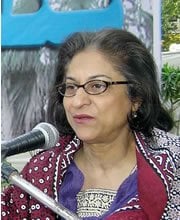By Asghar Azad
 KARACHI: People will soon witness a judicial dictatorship in the country if the judiciary continuously moves ahead in its present direction and then we would forget military and political dictatorships, Human Rights Commission of Pakistan (HRCP) Chairperson Asma Jahangir said on Wednesday.
KARACHI: People will soon witness a judicial dictatorship in the country if the judiciary continuously moves ahead in its present direction and then we would forget military and political dictatorships, Human Rights Commission of Pakistan (HRCP) Chairperson Asma Jahangir said on Wednesday.
While speaking at the Karachi Press Club, she said, “People want an impartial judiciary, and it is their right.”
She also said the HRCP was preparing a charter about judges’ appointments that would comprise requirements such as practice period of the person, and their proceedings of human rights’ cases and about other public interest matters. “We would not like pro-establishment judges,” she added.
Referring to a meeting between Prime Minister Yousaf Raza Gilani and Chief Justice of Pakistan Iftikhar Mohammad Chaudhry, she said the HRCP would not accept any give-and-take as an outcome of the meeting.
To a query, she said neither the parliament nor the judiciary were supreme; only the people are supreme because both the institutions have to serve the masses.
She criticised a section of the media and said civil society had always supported freedom of the media, but suppressing any voice in the opposition would go against the rights of the freedom of expression.
The HRCP demanded the government to make public the details of detained or arrested militants during the military operation in Malakand and Swat. The HRCP chairperson said hundreds of women and children of the militants had also been detained.
Responding to a question, she said the HRCP would send a fact-finding mission to ascertain the damages that occurred due to water shortage in Sindh. She said while visiting different districts of the province, she had observed shortage of potable water as well as lack of irrigation water had resulted in draught and destruction of fertile agricultural land.
She also said the government should formulate an education policy for minorities, as their children were compelled to study Islamiat as per the syllabi of government schools whereas they should have the facility to study their own religion.
http://www.dailytimes.com.pk/default.asp?page=2010\02\18\story_18-2-2010_pg12_6
In the drama played few days ago, left another scar on democracy, The democratic Govt withdrew the earlier notification and a superseding notification elevating Justice Saqib Nisar and Justice Asif Saeed Khosa of the Lahore High Court (LHC) to the Supreme Court (SC), retaining Justice Khwaja Muhammad Sharif as the LHC CJ, and appointing Justice Ramday an ad hoc judge of the SC for one year was announced. This meant that all the recommendations of CJ Iftikhar Muhammad Chaudhry were conceded, with the addition of Justice Khosa. The president has also been pleased to appoint 22 new judges to the LHC and nine to the Sindh High Court. For the moment at least then, it appears that the crisis between the executive and judiciary has been defused. Govt sagaciously resolved the matter and once again saved clash between institutions.
The entire situation left a very big question behind that is judiciary treading on the path of judicial dictatorship. In a democratic set up it is being thought that all the three pillars are bound to work with in their constitutional frame work so is it not so that judiciary is overstepping from its constitutional frame work? If it is Judiciary must avoid walking on the barbed wires. It would be quite fruitful for the country If the Judiciary rise above the personal clashes and work together with executive, Pakistan may come to see the kind of institutional stability that has been conspicuous by its absence so far. If not, we may well look back on the ‘settlement’ of the latest crisis as a case of the famous aphorism: A small compromise today engenders a bigger war tomorrow. No one who is a well wisher of the country can view such a possibility with sanguinity.